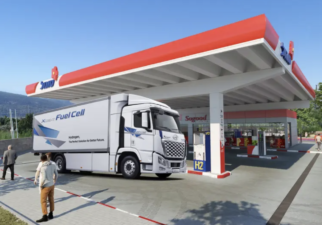 Last Tuesday, the consortium behind the Leviathan gas production facility declared “an historic turning point in the history of the Israeli economy” when – a decade after its discovery – the enormous offshore natural gas field started production. A joint press release from operating partners Noble Energy, Ratio, and Delek Drilling said that production is expected to lead to an immediate reduction in domestic electricity prices and the start of exports, “For the first time in its history, Israel is poised to become a significant natural gas exporter”. But rather than applauding potential low energy costs and increased national energy security, residents living near the gas platform abandoned their homes for a day of peaceful protest in Tel Aviv.
Last Tuesday, the consortium behind the Leviathan gas production facility declared “an historic turning point in the history of the Israeli economy” when – a decade after its discovery – the enormous offshore natural gas field started production. A joint press release from operating partners Noble Energy, Ratio, and Delek Drilling said that production is expected to lead to an immediate reduction in domestic electricity prices and the start of exports, “For the first time in its history, Israel is poised to become a significant natural gas exporter”. But rather than applauding potential low energy costs and increased national energy security, residents living near the gas platform abandoned their homes for a day of peaceful protest in Tel Aviv.
“We don’t want to play Russian roulette with our children’s health,” said Shlomit Valensi, a Homeland Guards member who lives in Dor, a beachfront community adjoining a nature reserve about 15 miles (24 kilometers) south of Haifa. More than 250 cars headed to Tel Aviv for a demonstration outside a government compound, according to the grassroots Israeli Homeland Guards who organized the protest. Greenpeace Israel and at least three other Israeli environmentalist groups supported the event. An estimated 1,000 demonstrators wore masks, others carried signs linking gas production to cancer, demanding that the facility close.
The Mediterranean oil field was discovered 130 kilometers (81 miles) west of the port city Haifa in 2010. It is estimated to hold 535 billion cubic meters (18.9 trillion cubic feet) of natural gas, along with 34.1 million barrels of condensate. Its production facility was constructed 6 miles (9.6 kilometers) offshore. We are afraid to breathe the air,” said Rachel Toaff-Rosenstein, a veterinarian from Zichron Yaakov. “This is something that’s going to change the rest of our lives.”
Opponents assert that the production process will release pollutants as toxic as those released by coal, particularly in the current start-up stage. This was verified by Leviathan documents submitted to the Environment Ministry which indicate pollution may be in higher concentration during the initial phase when flaring can’t be used. The worst-case scenario is that during the two separate days of starting up four wells, the emission level will be similar to that expected in an entire year of normal operations.
Despite protester concerns, the ministry said in a statement released Tuesday, “The effect on the air quality in the coastal area will be negligible,” adding, “According to experts, there is no danger to the public”.
The Leviathan partnership asserts there will be only a few hours of methane emissions, at levels well below limits set by Israel’s Clean Air Act. Methane is a primary contributor to global warming.
“The only environmental impact this platform will have on the shore is a positive one when the natural gas we supply displaces coal in Hadera and Ashkelon and Israel’s citizens benefit from improved air quality and better health,” said Bini Zomer, Noble Energy’s vice president for regional affairs.
Despite government statements that production was safe, Environment Minister Zeev Elkin delayed the start of operations by a week, saying strict pollution-monitoring conditions hadn’t been met. Monitoring equipment was installed on the platform to alert any risk of high pollution, but the Homeland Guards say they need to see how scrupulously it will be used before halting opposition.
Israel seeks energy independence and cleaner domestic sources, twin aspirations that support environmental and economic benefits. The nation also aims to achieve a broader regional influence, transitioning from an energy importer to a net exporter, with recently announced contracts with neighboring Jordan and Egypt. It is anticipated that the European market may also be a viable partner. Is commerce subjugating exploration of renewable energy alternatives and protection of environmental rights?
The Israeli Homeland Guards back development of the country’s gas industry but want to ensure public health isn’t compromised. They cite world-renowned experts whose models show the platform’s proximity to shore is valid reason for concern.
Fossil fuel companies have long clashed with regulators over pollution. In 2015, Noble (a member of the Leviathan consortium) settled with the U.S. Environment Protection Agency, the Department of Justice and the state of Colorado over violations relating to emissions from its operations.
The former head of Israel’s National Cancer Registry said in an opinion commissioned by the movement that the start-up stage may expose the public to a dangerous amount of carcinogens, including benzene, a byproduct of gas production.
Israel’s environment minister has promised to monitor air quality closely, promising to shut down the platform if there is “an increase in air pollution that is endangering the population.”
While natural gas is set to replace coal as the main fuel for power generation in Israel, it is still far from being a clean source of energy despite being less polluting than coal.
Cast your vote in our comment section: go gas – or – go green?



